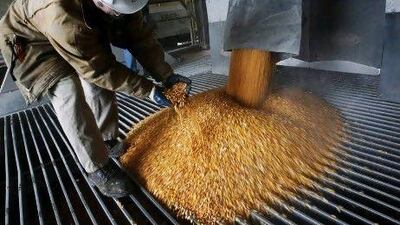A Henry Ford, the father of the American car industry, was among the first to predict a transition from oil-based fuels such as petrol and diesel to plant-based alternatives.
"There's simply no two ways about this fuel question," Ford said in 1916. "Gasoline is going and alcohol is coming. It's coming to stay, too, for its unlimited supply."
But after decades of research and development the cars and trucks of only one country - Brazil - are predominantly propelled by fuels, mainly ethanol, produced from purpose-grown crops.
The biofuels foreseen by Mr Ford are not only "renewable" in a way that petrol is not, but are also branded carbon-neutral because the greenhouse gas that still spews from the exhausts of cars is offset by carbon dioxide removed from the atmosphere by replacement fuel crops.
The carbon accounting can work out to zero only if biofuel crops are grown on land that would otherwise not support much plant growth.
Brazil, some experts argue, is one place where that actually is the case. The Brazilian sugar cane cultivated for ethanol is grown on formerly less productive land converted from cattle pasture.
In the rest of the world, however, the new "green fuels" are mired in controversies including land use disputes and trade issues.
Most commercial biofuel operations continue to rely heavily on subsidies, tax breaks and protectionist trade policies, and have proved even more vulnerable than the petroleum industry to cyclical downturns.
Then there are a host of technical hurdles to be overcome if the most promising advanced biofuels - those expected to have the fewest undesirable environmental side-effects, such as pushing up food prices and encouraging rainforest clearance - are ever to become economically competitive.
Biofuel from algae, an aquaculture initiative that would sidestep the fierce global debate about the wisdom of using arable land to produce fuel instead of food, is believed to be at least a decade away from commerciality.
Yet the biofuel sector still has strong believers.
"There's the potential to displace 50 per cent of global fuel supply without affecting food or pasture," Wes Bolsen, the chief marketing officer of the US biofuel technology developer Coskata, told a biofuel forum at the World Future Energy Summit (WFES) in Abu Dhabi this month.
"We've successfully scaled this technology. It is soon going to be cost competitive and compatible with multiple feed stocks. It's time to start building. The technology is here, it's available."
Coskata aims to commercialise a process for producing ethanol from plant materials such as wood chips and maize husks that are high in cellulose, without using expensive enzymatic treatments.
Partial combustion of the feedstock produces "syngas", a mixture of carbon monoxide and hydrogen. Next, proprietary micro-organisms are employed to convert the gas mixture into ethanol, which the microbes excrete as metabolic waste.
The company operates a pilot facility at its headquarters in Warrenville, Illinois, and a "semi-commercial" demonstration plant in Pennsylvania, which opened in October 2009.
But Ian O'Gara, the biofuels lead for Europe and Africa of the energy consulting and technology company Accenture, sees bumps on the road for the biofuels industry.
"Technology is a wild card," Mr O'Gara told the WFES forum. "Supporting technologies are coming through but also competing transport fuels.
"Electrification is the big challenge to biofuels. Biofuels have maybe 10 years before these competitors become significant."
Mr O'Gara agreed, however, that one way or another biofuels research would trigger big changes in transport.
"Most scientists don't agree on the most promising technologies, but there are so many technologies in play today that disruption is inevitable and will really start to be significant in the next five years," he predicted. "The market will only get more diverse and competitive."
Gregory Stephanopoulos, a professor of chemical engineering at the Massachusetts Institute of Technology, heads a research project to bioengineer "obese" microbes that produce and store large amounts of oil. He is cautiously optimistic about the future of biofuels.
"The technologies are not quite there yet, but they are getting closer and closer," Prof Stephanopoulos told the WFES.
Producing ethanol from cereal crops and sugar cane was already commercially viable, and prospects for improving yields were "very good", he said.
Development stage technologies for producing ethanol from cellulose could be deployed within the next two years. But other biofuel technologies required much more work.
Arnaldo Walter, a professor of mechanical engineering and energy at the State University of Campinas in Brazil, answered the question of whether the world needed biofuels with a resounding "yes".
"Under a very optimistic scenario for de-carbonisation, we need biofuel to account for 20 per cent of fuel supply by 2050," Prof Walter said.
"Chemicals and other products must also be produced from plant-based feedstocks. Biomass will be important not just as an energy source."
tcarlisle@thenational.ae

Biofuels drive a major change
There remains much work to be done before fuel from purpose-grown crops becomes a viable alternative to oil-based energy in transport. But developers are cautiously optimistic for the future, one they say is closer than many expect.
Most popular today
